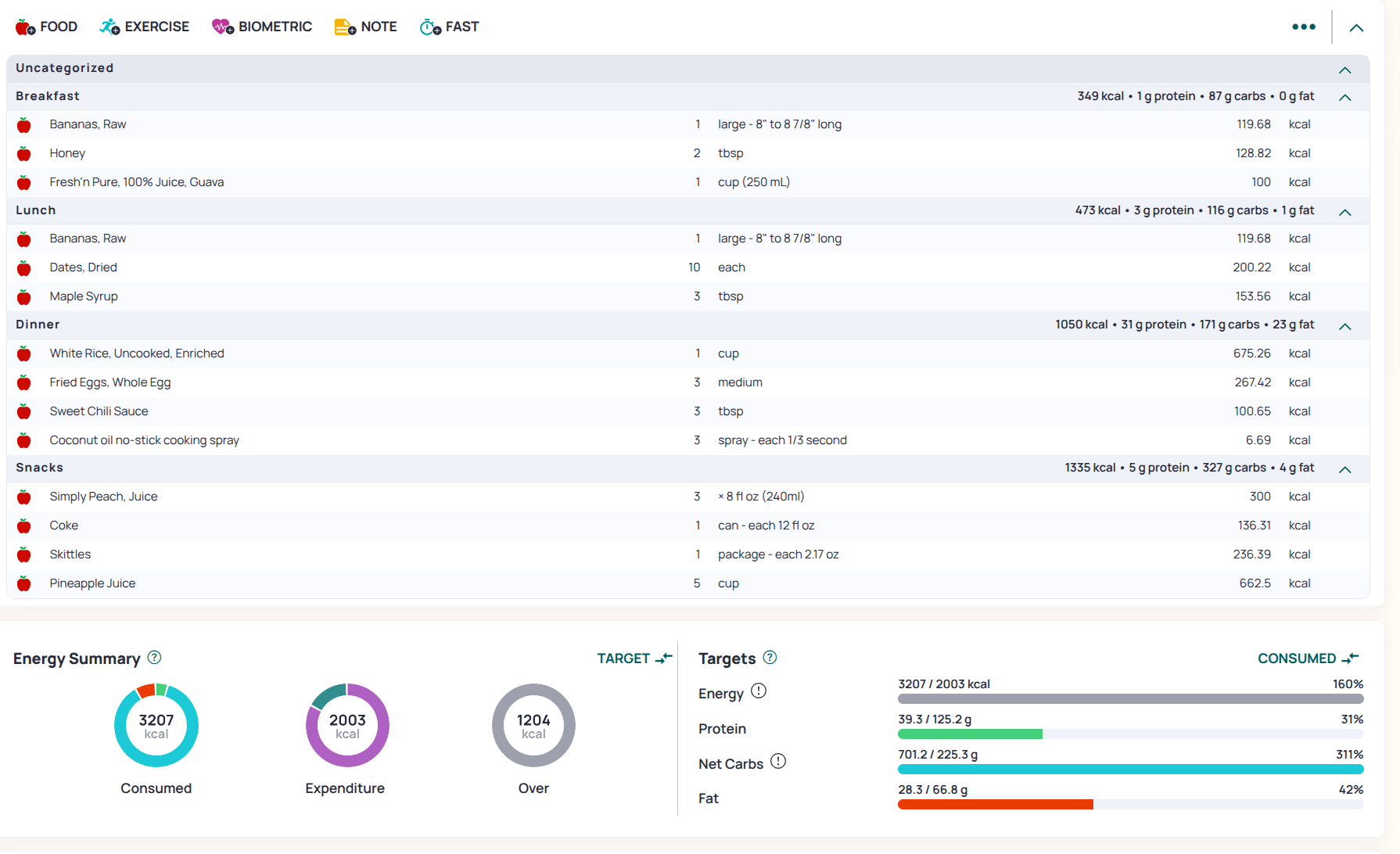@Kilgore
I didn’t say to eat 5-600 K/cal. as often read in a 5.2 diet. You’ve well done to attract the attention that when starving the body you could depress the metabolism (brain and thyroid). Always listen to the body reaction and adapt if required, otherwise metabolism will slow down (spare mode).
If we except people with glycemia problems, who shouldn’t follow a low-calorie diet, I said we shouldn’t eat less than 80 % of our needs, on a regular basis. Or you’ll pay it soon or later, with a lack of essential nutrients, on top of that. The problem is not to lose weight, but not to regain the lost weight and gain more on top of it as in 90% of cases.
So to be clear, what I mention:
a) 5 days, I advise to eat / take your usual intake. 100%
Mind the breakfast / the first meal as the insulin reaction of the first meal is going to impact the rest of the day.
If you eat less – no matter why – which I do not advise (no need here to lose weight), don’t eat less than 80 % of you metabolic needs (metabolism + physical expenditure). Focus then on nutrient-dense foods.
b) 2 days a week (not in a row) between 1200-1600 K/cal. So usually 2 meals.
Why this level and not 5-600 K/cal., as often read. Our 3 mains organs require that amount to function well (liver, hart & brain).
Note: If we combine 5.2 with 16.8 – what I try when want to lose excess weight (> 23 BMI), it’s ideal to take advantage (1)
NB: Most of us will have to make staples, to reload energy or to make it easier when encounting a Herxheimer reaction (detox reaction).
It's also normal to stall at some point during weight loss. 2 to 3 weeks is quite common. Don't rush things, or your brain will make you pay (slow-down mode). At that moment, 8-10 days after a pause, you can exercise, but in cardio mode, not in high intensity. For instance bike, quick walk (6 – 8 Km/H) or swimming.
A dynamic pace but manageable over a long distance (30 minutes). Avoid exceeding 120-140 heart rates (80% of MHR)
MHR: 220 – age.
For beginners, and to obtain a more accurate measurement, it is recommended to perform a supervised stress test.
Sources and References
The 16:8 diet, an intermittent fasting method, can potentially offer several brain-related advantages by promoting metabolic switching and autophagy, a cellular cleanup process. These mechanisms may enhance brain resistance to stress, improve cognitive function, and potentially slow down age-related cognitive decline.
Counter-indication: glycemia problems and brain disturbances (emotional instability).
Mark Mattson, senior investigator for the National Institute on Aging, which is part of the US National Institutes of Health (NIH), has researched the health benefits of intermittent fasting, as well as the benefits of calorie restriction. According to Mattson, there are several theories to explain why fasting works:
http://fitness.mercola.com/sites/fitness/archive/2013/06/28/intermittent-fasting-health-benefits.aspx?e_cid=20130628_DNL_art_1&utm_source=dnl&utm_medium=email&utm_content=art1&utm_campaign=20130628#_edn6
Note (LucH): I don't take Dr. Mercola's advice for granted. Too biased. Not suitable for everyone.
*) The Health-Promoting Effects and the Mechanism of Intermittent Fasting
J Diabetes Res. 2023 doi: 10.1155/2023/4038546
Health Benefits of IF
IF can trigger autophagy, a cellular process that helps remove damaged cells and promotes tissue regeneration, potentially contributing to longevity and disease prevention.
Insulin sensitivity (HbA1c)
Weight Loss by people with high BMI
Reduced Inflammation (improving gut health and a healthy gut microbiome)
Cellular Repair and Protection
*) Health Benefits of Intermittent Fasting
Microb Physiol 2024. https://doi.org/10.1159/000540068
There are many benefits in losing weight; boosting immunity; countering the risks of diabetes, cancer, and cardiovascular diseases; and slowing the process of ageing. IF studies in animal models suggest that the process induces longevity, improve metabolic health, and positively influences hormonal changes. IF also seems to influence inflammatory reactions, lipid metabolism, and insulin sensitivity.
Other sources
CMAJ April 8, 2013
http://www.cmaj.ca/site/earlyreleases/8apr13_intermittent-fasting-the-science-of-going-without.xhtml
Prostate Cancer Prostatic Diseases 2010;13:350-5
http://www.nature.com/pcan/journal/v13/n4/full/pcan201024a.html
CMAJ March 20, 2013
http://www.cmaj.ca/content/early/2013/03/25/cmaj.109-4437
Eurekalert, Study finds routine periodic fasting is good for your health, and your heart, April 3, 2011
http://www.eurekalert.org/pub_releases/2011-04/imc-sfr033111.php
Free Radical Bio Med 2007;42:665-74
http://www.sciencedirect.com/science/article/pii/S089158490600801X
International Journal of Obesity 2011;35:714-27
http://www.nature.com/ijo/journal/v35/n5/full/ijo2010171a.html
Washington Post December 31, 2012
http://www.washingtonpost.com/national/health-science/fasting-may-protect-against-disease-some-say-it-may-even-be-good-for-the-brain/2012/12/24/6e521ee8-3588-11e2-bb9b-288a310849ee_story.html?tid=wp_ipad
